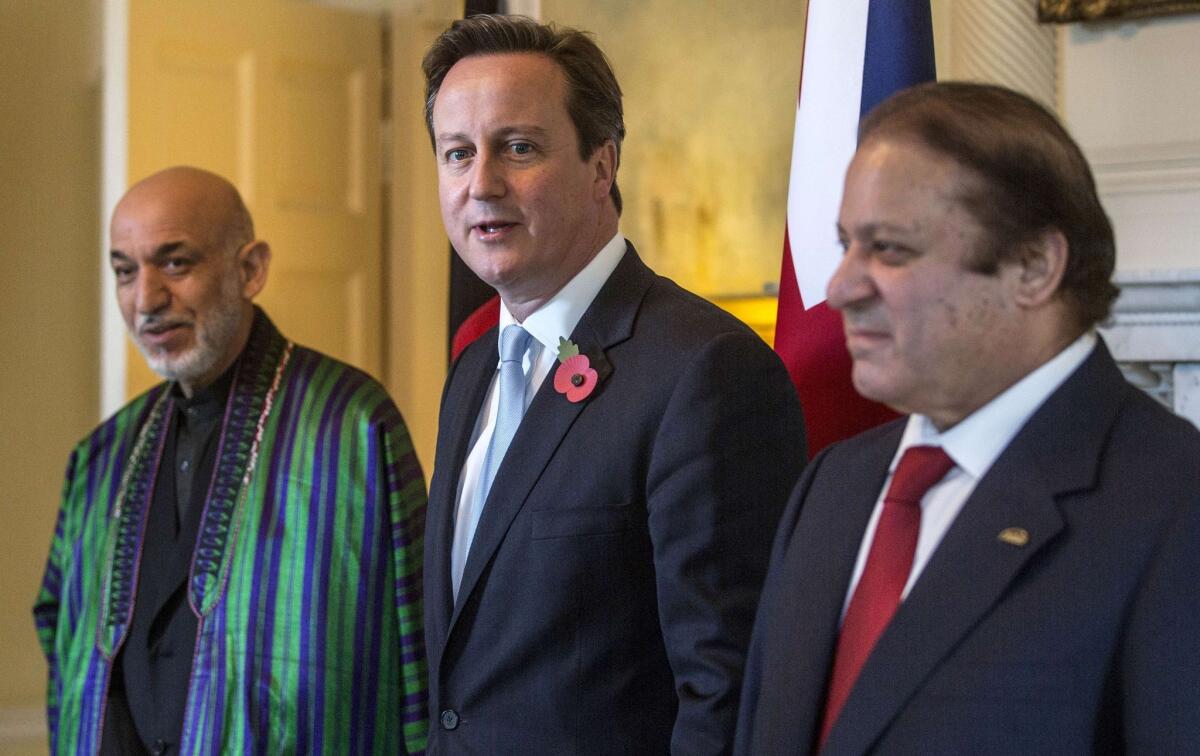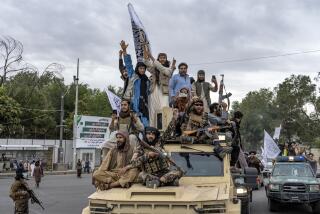Afghans to send delegates to meet with Taliban in Pakistan

- Share via
KABUL, Afghanistan -- Afghanistan will send a delegation to Pakistan soon in an attempt to open channels with the Taliban toward a peace deal, officials said Wednesday.
Afghan President Hamid Karzai said in a statement that he and Pakistani Prime Minister Nawaz Sharif agreed to the initiative in London this week as part of a three-way conclave with British Prime Minister David Cameron aimed at bolstering stability in the volatile South Asia region.
Afghanistan’s High Peace Council, a group formed by Karzai in 2010 to pursue a political settlement with the Taliban, will send a delegation to meet with former deputy Taliban leader Mullah Abdul Ghani Baradar, the president’s office said. No date was given for the trip.
A significant number of leaders of the Afghan Taliban are based in Pakistan, fueling Kabul’s belief that Pakistan’s influence and support are crucial for any political agreement. Some Afghans see Baradar, who was released from a Pakistani prison last month and is reportedly close to reclusive Taliban leader Mullah Mohammed Omar, as a key intermediary who could help restart peace talks.
But critics question the likelihood of success, given the Pakistanis’ fears that a stable Afghanistan would align with their historic enemy, India.
“We should not expect much out of these talks,” said Waliullah Rahmani, executive director of the Kabul Center for Strategic Studies, an Afghan think tank. “I don’t see strong political will in Pakistan to support the High Peace Council’s initiative. I believe Pakistanis still think that political reconciliation in Afghanistan doesn’t serve their interests.”
Karzai is eager to open a dialogue with the Taliban, analysts said, perhaps sensing that his political hand is getting weaker. Afghan security forces are assuming more responsibility for their nation’s security, but struggle with weak training, equipment and morale. And with foreign combat troops set to leave by the end of 2014, some question whether the Afghan government will be able to maintain its grip on power.
The Taliban is also in no hurry to negotiate, presumably convinced that time is on its side. In recent months it has exploited the international coalition’s drawdown to regain territory it previously lost. And the militant group has repeatedly balked at negotiating with Karzai, who is nearing the end of his final term in office, or the High Peace Council, which it refers to as lapdogs of the Americans.
Nor is it clear that Baradar can deliver. After three years in prison, he may be out of touch with many younger generation Taliban leaders. And while Islamabad says he is free to go where he wants since his release, he is reportedly closely monitored by Pakistan security agencies, further undercutting his credibility with militants.
“Pakistan is trying to manage Baradar’s involvement to serve its own goals,” which also include having inordinate influence in Afghanistan, said Rahmani. “The only answer is for Afghanistan to develop its own multipronged approach, with clear political and military strategies aimed at fighting the insurgency.”
At the Karzai-Nawaz meeting in London, the two leaders also agreed that their respective interior ministers would meet soon to discuss security along their porous shared border and to cooperate in the “elimination of terrorist sanctuaries.”
Pakistan also expressed support for the upcoming election of the Afghan government, which the Taliban has condemned. Although Karzai is not eligible for a third term, political analysts said he is trying to shape the selection of candidates to maintain influence.
ALSO:
Dozens burned to death in India luxury-bus fire
Europeans handed over phone records, U.S. says
Turkish market on Syrian border serves the discerning rebel
Twitter: @MarkMagnier
Special correspondent Baktash reported from Kabul and Times staff writer Magnier reported from New Delhi.
More to Read
Sign up for Essential California
The most important California stories and recommendations in your inbox every morning.
You may occasionally receive promotional content from the Los Angeles Times.










